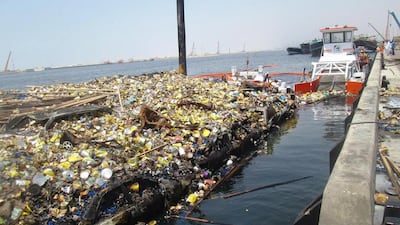The UAE’s addiction to takeaway food is creating a worrying tide of single-use plastic waste, experts have warned.
According to figures from auditors KPMG, around three in four residents in the Emirates order a meal for delivery at least once a week.
Many of those meals arrive in multiple containers which are more often than not made of plastic, according to environmental campaigners.
But some individuals and companies are now fighting back; with supermarket chains carrying out trials for charging for plastic bags and a number of hotels banning plastic straws and bottles.
“There has been no extensive research to assess the impact that plastic has on us,” said Habiba al Marashi, the Emirates Environmental Group’s founder and chairperson.
“We’re told that it’s safe but you never know - especially with the hot food that goes in these containers.
“With environmental protection you need to be conscious of every step that you take. You need to ensure that your impact on the environment is as little as can be.”
The average UAE resident produces 2.7 kilograms of food and packaging waste per day, according to Dubai Carbon, a government-backed group set up to encourage a low-carbon, green economy.
And campaigners say finding ways to generate less waste matters, especially if authorities are serious about being more environmentally aware.
In recent years, the private sector has made real inroads into the problem. In Abu Dhabi, Urban Retreat food hub in Yas Mall is offering customers who bring their own plates, cups and other containers a 20 per cent discount on their bill until the end of August.
Meanwhile, the supermarket chain Waitrose is carrying out its first trial in charging for plastic shopping bags in the capital, and plastic straws and bottles are off the menu at Hilton’s Abu Dhabi hotels, as well as Park Hyatt, The British Club near Mina Port, the health food restaurant Skinny Genie and numerous other restaurant chains.
Additionally, the popular food ordering service Zomato, also now gives users of its app the opportunity to deselect being given plastic cutlery with their meal, though customers have said their orders often still come with plastic items in spite of their requests.
Amruta Kshemkalyani, a Dubai-based sustainability consultant, is just one of several people working hard to persuade firms to give up single-use plastic.
She said the tide of opinion had just started to change across the country, but recognised there remained a long way to go.
“Just one takeaway delivery can contain 10 or 15 plastic containers,” she said.
_________
Read more:
Bring your own plate and cups and get a discount at this Abu Dhabi restaurant
Plastic pollution: we’ve poisoned the sea, now it’s coming for us
The final straw: here are the alternatives to plastic
The unsettling facts about plastic pollution
Profligate plastic waste needs action now
_________
Despite the scale of the challenge, environmentalists say there are solutions.
Some experts point to the lunchbox delivery and return system in Mumbai, India – known as the dabbawala.
Every morning in the west coast city, a 5,000 strong army of men and women called dabbawalas set out to collect more than 175,000 packed lunches from homes and kitchens in the suburbs.
The system - which is so efficient that it has been studied by Harvard Business School - delivers tens of thousands of tiffin boxes, which contain a three-course meal, to destinations within two hours.
“Something like this could be possible in the UAE because we already have a great structure or system of delivery guys,” said Mrs Kshemkalyani, who is from the home of the dabbawalas in Mumbai.
“Mumbai has a much larger population and the infrastructure is not as good, so if they can do it, why not the UAE?
“Many years back when I was new to Dubai, I used to buy stackable stainless steel containers which I would give to the restaurant.
“Our restaurants here can do it and the people in the UAE could do it.”
In fact, some restaurants already do something similar, she said.
A small number of Indian restaurants in Bur Dubai already delivering meals in reusable containers. And others are picking up on the trend.


